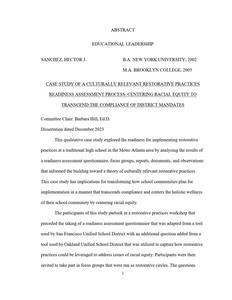- Collection:
- Atlanta University and Clark Atlanta University Theses and Dissertations
- Title:
- Case Study of a Culturally Relevant Restorative Practices Readiness Assessment Process: Centering Racial Equity to Transcend the Compliance of District Mandates
- Creator:
- Sanchez, Hector J., Clark Atlanta University
- Date of Original:
- 2023-12
- Subject:
- Degrees, Academic
Dissertations, Academic - Location:
- United States, Georgia, Fulton County, Atlanta, 33.749, -84.38798
- Medium:
- born digital
- Type:
- Text
- Format:
- application/pdf
- Description:
- This qualitative case study explored the readiness for implementing restorative practices at a traditional high school in the Metro Atlanta area by analyzing the results of a readiness assessment questionnaire, focus groups, reports, documents, and observations that informed the building toward a theory of culturally relevant restorative practices. This case study has implications for transforming how school communities plan for implementation in a manner that transcends compliance and centers the holistic wellness of their school community by centering racial equity. The participants of this study partook in a restorative practices workshop that preceded the taking of a readiness assessment questionnaire that was adapted from a tool used by San Francisco Unified School District with an additional question added from a tool used by Oakland Unified School District that was utilized to capture how restorative practices could be leveraged to address issues of racial equity. Participants were then invited to take part in focus groups that were run as restorative circles. The questions from the focus groups were derived from the 12 Indicators of Restorative Practices Implementation: Checklists for Administrators, a tool developed by Dr. Anne Gregory out of Rutgers University that was employed to provide even more of a social justice and racial equity lens. The results of this readiness assessment process informed the school's ability to implement restorative practices to improve its cultural competence and sense of belonging amongst its community members. The readiness assessment questionnaire and focus groups had a racial equity lens that informed the building toward a theory of culturally relevant restorative practices that provided insight into implementation. The findings have implications for educational leaders both at the district and local levels. This study confirmed the theoretical proposition that by conducting a readiness assessment process aligned to racial equity, schools are better informed on how to implement a restorative practices program that meets the holistic needs of their community and transcends compliance. This now allows for future replications to begin the process of building toward a theory of culturally relevant restorative practices.
- External Identifiers:
- Metadata URL:
- http://hdl.handle.net/20.500.12322/cau.td:2023_sanchez_hector
- Rights Holder:
- Clark Atlanta University
- Original Collection:
- Atlanta University and Clark Atlanta University Theses and Dissertations
- Holding Institution:
- Atlanta University Center Robert W. Woodruff Library
- Rights:
-
